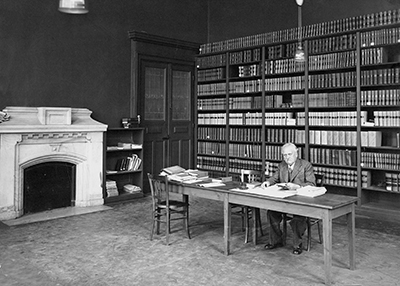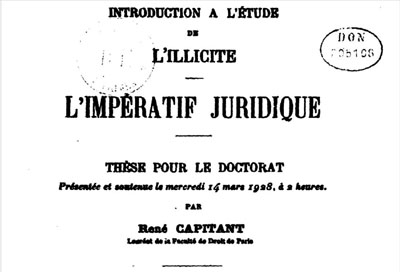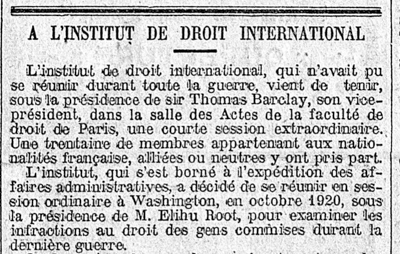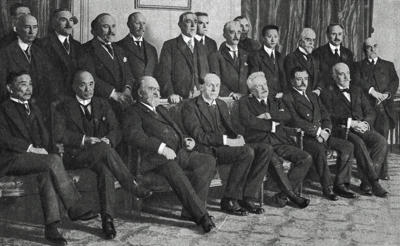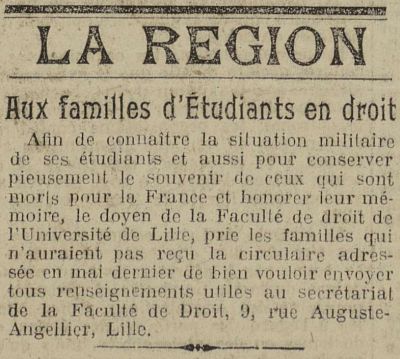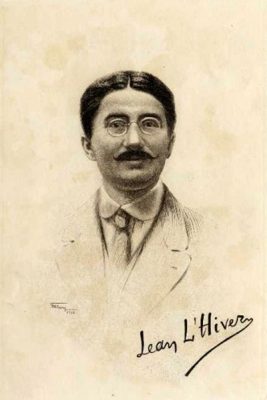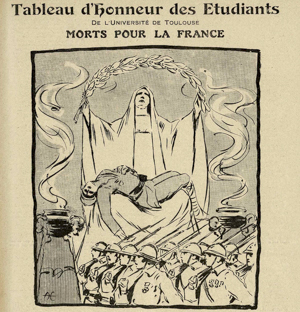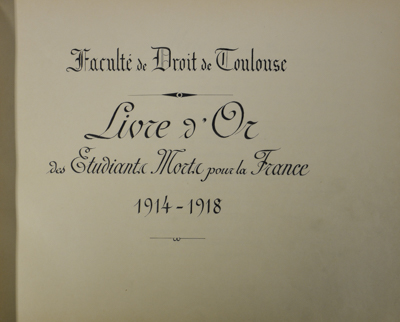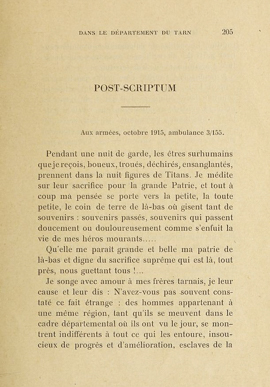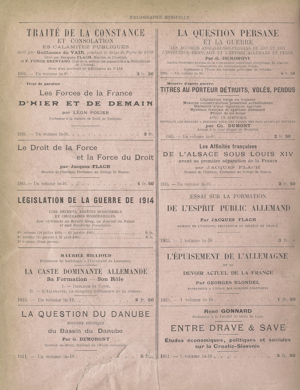Even before the signing of the armistice with Germany, the University of Lyon had entered fully into this movement characterized by the efforts of civil society, in order to convert military relations between allied nations into cultural exchanges that were hoped deep and fruitful. The Alliance thus sought to renew itself, while deepening itself, since one would strive to access facets hitherto totally unknown or little known to the culture of yesterday’s military ally. In short, it was hoped that the temporary fraternity of arms would be converted into a solid friendship, which would, however, be lasting only if each made the effort to know the other better. It was American academics, grouped within the American University Union (AUU), who, even before the end of thepour lire la suite…
Tag: France
From the “legal war” to the “Roaring twenties” of legal science
Law was at the heart of the struggle between the Axis and Entente powers. French jurists used all their rhetorical weapons to spread the values of “Latin civilization” in the face of “Teutonic barbarism”. The propaganda of the war of law against force revived hatred and the desire for revenge against an enemy hated as much as it was admired since its victory in 1870, which is attributed to the supposed superiority of German universities. Argument of mobilization of the fighting masses, the legal war was transformed into an ideological opposition between two models with hegemonic pretensions, one valuing “the French genius”, the other the German “kultur“. In this confrontation of paroxysmal violence, jurists were on all fronts. Engaged in the trenches or serving at thepour lire la suite…
French Law faculties on the post-war media scene : a vengeful and hopeful reconstruction
A test for French society as a whole, the Great War was also a test for academic environments, law schools especially. These “diverse little societies”, as Immanuel Kant called them, which would be a part of the “scientific state” that is the University, were devastated by a conflict that mobilized the whole of society in the war effort. Law schools, according to a well-established tradition, had so far remained rather closed on themselves. Enjoying the position of “professional faculties”, in the same way as the faculties of medicine, they did not cease to attract in their amphitheaters, promotions of students whose important numbers guaranteed the finances, as well as the growth of the teaching staff. In addition, this influx made it difficult to even usepour lire la suite…
Participation of French jurists in the Peace Conference of 1919
At the end of the conflict, the victors of the First World War had wished to give a new legal colour to the Europe that would appear on the debris of the fallen empires. Clemenceau had thus spoken of the creation of a “Europe of Law” which should be the ultimate objective of the Allies when they went to negotiate peace. In this context, the Allies had to rely on legal experts, in particular international law experts, whose technical advice had been regularly sought for the purpose of providing expertise. “Jurists” here shall refer to those who through their training knew the Law, and thus practiced or applied it. What mark did the French lawyers leave on the negotiations and the peace treaties ? Did theypour lire la suite…
War and student death at the Lille Faculty of Law (1914-1918)
The commemorative plaque, now set in front of the entrance, in the largest hall of the Lille Faculty of Law, does not attract attention. And yet it is up for everyone to see, both from the ground and from the hallways, in particular the one leading to the hall of acts, where the audience gathers during the defense of theses. Although the commemoration of the centenary of the First World War sparked a renewed interest in this monument, it has absolutely nothing to do with the emotion that gripped all those who, in the aftermath of the conflict, lifted their eyes to the impressive list of names engraved in marble. Mass death At the start of the 1913-1914 school year, there were 351 students. At the firstpour lire la suite…
Stories of Bordeaux students who “died for France”
The outbreak of war in the summer of 1914 led all European states to solicit the greatest sacrifice from their able-bodied male population. Thus France solicited most of its twenty years old citizens, nineteen even, till the past forty, to join the ranks of the active army. Even if the students appeared as a minority, their departure to the front left a mark. By themselves, they embodied youth, as students were the only social group composed almost exclusively of young people. From then on, the faculties concentrated what could be called “the youth of France”, scrutinized in particular by journalists. In the provinces, student populations were much less important than in Paris. Nevertheless, they continued to grow, as in Bordeaux, where the number of studentspour lire la suite…
On the war memorials at the Toulouse Faculty of Law
“Et puis honneur à nos grands morts qui nous ont fait cette victoire ! [And honored be our great dead, who made this victory for us!]” Georges Clemenceau, Chamber of Deputies, November 11, 1918 Men live. They also die, sometimes very young and before their time. Memento mori ! Remember death, the old societies repeated. Our old masters liked to quote Latin – the authorities and philosophers of our Antiquity. Death is inevitable, but seems far ahead of us. But in the heat of August 1914, once war was declared, death did not prowl. It was present, everywhere, often, for those who had gone to the borders to defend the country. As provided for by the provisions of the General Staff since the spring of 1914, Plan XVIIpour lire la suite…
Institutional memory : the Livre d’Or of the Toulouse Faculty of Law
From the very beginning of a war that was quickly imagined victorious, the loss of life proved to be immense and, to keep the accounts up to date, no one waited for the law of October 25, 1919 “relative à la commémoration et à la glorification des morts pour la France au cours de la Grande Guerre [relating to the commemoration and glorification of those who have died for France during the Great War]” providing for the constitution of a Livre d’Or, which was to list the names of the sons of each commune who took part in the conflict. For financial reasons, the planned 120 volumes would not see the light of day. Like many other institutions, the Toulouse Faculty of Law quickly tookpour lire la suite…
The doctoral theses of the Toulouse Faculty of Law in the face of war
A break in doctoral practices The first effect of the war on the production of theses at the Toulouse Faculty of Law was first observed in the number of theses defended, which decreased drastically in 1914. The pre-war years saw regular defenses for thirty to forty theses, and even though the year 1911, with its 50 theses, marked the beginning of a decline (due both to a change in the conditions for awarding the doctorate in Toulouse in 1911 and a general decline in the number of students in all the faculties of the south affected by competition from Limoges and Clermont-Ferrand from 1909), the two years before the war still saw 34 and 25 doctoral defenses respectively. But a total collapse occurred from the beginning of the war : only one thesispour lire la suite…
Between science and patriotism : legal journals at war (1914-1918)
In the summer of 1914, an unprecedented armed conflict broke out in Europe. The breadth, brutality and global spread of this war, which was imagined to be short, earned it the name of “the Great War” ; it was also to be “the war to end all wars”. However, before the sound of the first cannons, before the first trenches were dug, a class of the population was already particularly mobilized on another front. Indeed, French and German scientists had been engaged for several decades already in a real “war of science” in physics, chemistry, medicine, war exalted by patriotic sentiment and by continuous progress in these disciplines. In law, the scholarly conflict had been raging for much longer still, opposing French jurists, their “rational” model andpour lire la suite…

